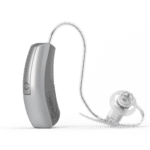When you have significant hearing loss, it changes your experience of the world. Hearing impairment requires adaptation and adjustment- from navigating noisy events to making sure you have alert systems in your house that are able to catch your attention and wake you from sleep. When you get on the road with hearing loss there are, of course, special concerns to think about.
Even though a car ride may seem like a quiet event, there’s actually a lot of noise to avoid. If you have hearing loss you can help cut down on confusing noise while you drive by keeping your windows up. Wind noise can be distracting even to drivers without hearing damage, which can reach dangerous sound levels. When wearing hearing aids, wind noise can get amplified and can be especially unpleasant. Even if you don’t have hearing aids yet, wind noise can distract your hearing from important sounds on the road. Even when the weather seems ideal, opt for your air conditioning and climate control – it will give you a smoother, safer ride.
2) Get Direct Directions
If you are going somewhere unfamiliar, you’ll want safe and clear navigation. Consider a GPS device for your car, mounted in a place where you can easily glance at its screen and read your next direction. If you have a smart phone with a navigation app, like Google Maps, make sure directions are presented as text in addition to being spoken. Get a dashboard mount for your smart phone to keep directions in easy sight while you drive. Additionally, some hearing aids will give you the option of streaming smart device audio, like driving directions, directly into your ear. Otherwise you can amplify audio directions through most car stereos.
When you aren’t relying on navigation devices, make sure to plan your trips carefully and write out the steps clearly. Tape your directions somewhere on the dashboard where they can be easily read. Have an area map or atlas on hand so you can plan alternate routes if a road is closed.
3) No Room For Distractions
When you’re driving with hearing loss you’ll want to keep the cabin of your vehicle free from distractions. You’ll need to use your hearing to be alert for emergency sirens, unusual vehicle noises and other traffic. To keep your ears on the road, avoid listening to music or radio while you drive. With hearing loss, it takes more cognitive effort to comprehend sounds and respond to them, so you’ll want to let your hearing concentrate on your driving.
Similarly, with a hearing impairment your reliance on visual information increases. Keep your eyes on the road and don’t indulge in distractions. Activities that take away from your vision and coordination should be avoided while your car is in motion. If you’re going to eat or need to find something in your bag or back seat, do it once your car is safely parked. Trying to multi-task only makes driving riskier, and the consequences are never worth it.
4) Consider a Visor Card
In the event you need to deal with a traffic officer or highway patrol, you may want to consider carrying a visor card clipped to the inside of your windshield visor. The card is a clear way to announce to the officer that you may have trouble hearing their directions. In the event you are pulled over, you can put your visor down and swing it towards your window then keep your hands on the wheel.
Some visor cards also have visual symbols that will help you to communicate. Alternately, carry a pad of paper and a pen in your pocket or glove box. In the event of a traffic stop, getting instructions in writing can help keep communication clear. Whether you are asking for directions or sorting out a speeding ticket, visor cards and writing tools can be of great assistance getting everyone on the same page. Laminated and pictorial visor cards can be ordered online or downloaded. Some free, print-at-home visor card templates are available from the Center for Hearing Loss Help as well as other organizations for hearing loss awareness.
5) Prepare with a Hearing Exam
If you or someone close to you thinks you have a hearing loss, it’s advised to get a comprehensive hearing exam performed to evaluate your current hearing abilities. Often people don’t even realize their hearing loss is an issue given the gradual nature of most hearing deficiencies. Contact us to schedule a complimentary hearing test at one of our hearing centers across the country. If you do have treatable hearing loss, we’ll work with you to find an appropriate device. Something as small as a modern hearing aid can make a world of difference in how safe and alert you feel behind the wheel. Let us help you make sure you are getting the most from your hearing with personalized hearing care, including top-brand hearing aids and free comprehensive hearing testing. Set up your next appointment with us today!


